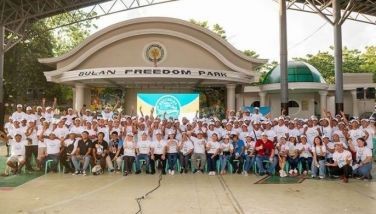Redeeming the Senate
Once the most respected of pre-martial institutions, the Senate of the Philippines has long fallen upon hard times.
Compared to the much-reviled House of Representatives, the other half of the legislature, the Senate still enjoys a residual measure of respect from the people, but it’s nothing close to the enormous prestige it once commanded.
At the height of its popularity in the 1960s, it was called the nation’s “most exclusive club†and the breeding ground of presidents who were all expected to stand in awe and respect to the one body they could never regard as Malacanang’s satrapy.
More than the US Senate in relation to the White House, the Philippine Senate owed its power to the fact that its members were elected by a national vote or exactly the same widely-based electorate that chose the nation’s presidents.
It was not unusual for a Filipino senator to draw more votes than the president and thus feel, rightly or wrongly, that his mandate equaled or exceeded that of the tenant of Malacanang. In contrast, his American counterpart was (is) elected by voters in the state level — two senators from each of the 50 states — and therefore hardly in a position to speak of a national constituency.
Of the Philippines’ 14 president, 10 made their big jump to power from the Senate, thus buttressing its reputation as the unchallenged past and future repository of dignity and power. But even senators who never became presidents like Claro M. Recto, Jose W. Diokno, Lorenzo Tanada, Ambrosio Padilla and Jovito Salonga have been regarded with deep respect and honor that sometimes exceeded that accorded to former colleagues who had moved farther up.
To cross swords with the old lions of the Senate was the ultimate challenge for neophyte members. Delivering impassioned speeches and exposing the chicaneries of the palace crowd endowed the ambitious ones with the aura of a future president. This was certainly the path to power that Benigno S. Aquino, scion of a former senator and father to another senator who would become president like his mother, doggedly pursued until he fell victim to the Marcos dictatorship.
But the golden days of the Senate are said to have vanished in the wake of martial law in 1972, which shut it down for 15 long years. When it was belatedly revived in 1987, it was regarded, by common consensus, as a pale shadow of its former glory.
Although the initial batch of post-Marcos senators included old stalwarts like Salonga, Ponce Enrile and Maceda, they were not viewed as of equal caliber with their more illustrious predecessors. Indeed, quite a number were sons and daughters or relatives of once-famous names who were condemned to stand in the shadow of their forebears.
More pathetic was the entrance of rank unknowns, some with measly or non-existent pedigrees and others with dubious backgrounds in entertainment, sports as well as law enforcement whose cadres had never been taken seriously as potential recruits for the august body.
Empowering such new forces would not have inflicted much damage upon the institution had they performed in any manner that would have placated negative judgment or prejudice earlier directed at them. But the notoriety of some senators has unfortunately stuck like glue on the long-depreciated honor of the institution.
What explains the Senate’s sad and seemingly irreversible decline before the nation and the bar of history?
First and foremost, the haphazard and uninspired revival of democratic institutions under the 1987 Cory Constitution.
Second, the sudden and prolonged interruption of the natural succession of the nation’s leaders.
Third, the collapse of the economy from a newly industrializing to a labor exporting and remittance-dependent state.
Fourth, the lamentable deterioration of literacy, education and public opinion.
Because the Marcos regime lasted so long and collapsed so fast, the new government that took its place had no road map to power or barely improvised its governance as it went along.
Political correctness and premature reconciliation doomed the Cory regime before it could solidify its power and defend itself from the plague of coup attempts.
Wanting to be the “exact opposite†of Marcos, the hastily drafted constitution imposed an ill-defined multi-party system in place of the two-party system that Marcos had obliterated. Like the old parties, the new ones lacked ideological coherence and were cobbled together as organizations for the winning of elections and nothing more. Loyalties shifted and programs of government changed with every realignment of forces, these movements often dictated by personal reasons and nebulous priorities.
By restoring the original single-term six-year presidential term, the constitution all but made it inevitable that every President would seek to undermine the constitution as Quezon had done to get a term extension. This poisonous spirit of warfare infected the presidency and Congress and all other political bodies.
In the absence of two established parties, every presidential candidate created his or her own party, thus creating multiple electoral slots that had to be filled regardless of the candidates’ qualifications.
The 1992 election brought this situation to absurd levels with seven presidential candidates inflicting 24 candidates each for the Senate along with dozens of local candidates on the same ballot. The confusion turned the election into a crazy game of name-recall that has irreparably given Filipino politics a bad name.
Never has the Senate been regarded as one big joke with basketball players, cookbook authors, former beauty queens, comedians, TV anchors, relatives of politicians and mothers of crime victims — most without any previous experience in governance — vying for top government positions. A good number of these characters have actually been elected over the years, turning politics into unmitigated farce universally denigrated by the media and the electorate.
“Democracy has literally gone to the dogs,†says one veteran journalist. “The old politicos were no saints but they can only loom as giants and paragons of virtues compared to the present horde of wannabes and fools. No wonder nobody halfway decent wants to enter politics and decency has become a rare commodity.â€
In the old days, each of the two parties took pains to give equal representation to the different regions. Every two years we elected eight Senators and both slates pitted candidates from, say, Bicol, against each other, then Mindanao, the Ilocos and Central Luzon. There was an established hierarchy from local government units and Congress, for candidates to move up to the Senate on the basis of seniority, merit and popularity.
Since 1987, it has been a mad scramble for the Upper House that resulted at one time, according to a vehement critic, in La Vista, an elite village in Quezon City, accounting for five senators and the whole of Mindanao without a senator to represent it.
With popularity and money as the main criteria, politics has turned into a rich man’s game dominated by candidates with media connections and deep pockets to finance nation-wide campaigns.
With the country more and more dependent on overseas labor deployment, the people’s morale has suffered considerably.
“We used to be the proud showcase of democracy in Asia,†notes a well-known university professor. “We did not hesitate to speak out in international conferences on the vital issues of the day — human rights, US domination, the status of minorities, etc. Now we have been silenced or pushed aside by the realization that we are an economic basket case that big countries can just push aside. It’s pathetic that nobody pays heed to our voice anymore.â€
Education and public opinion have suffered tremendously. The public schools have collapsed in the face of budget cuts and ballooning population. English has given way to Taglish and communications itself has been reduced to incoherent texting.
All these negative trends partly explain why the Senate has lost so much luster that its relevance as a forum for the discussion of national interests has become suspect.
Just how fragile the Senate’s reputation has become has been demonstrated by the recent scandal over million-peso “Christmas gifts†to senators out of supposed “savings†that could have been better used by a cash-strapped government.
The alleged discrimination practiced by the Senate leadership to punish non-allies barely explains the massive public revulsion that accompanied the scandal. More shocking was the utter waste of resources in secret and confidential funds that are not accounted for or insulated from lawful scrutiny.
Even more unacceptable is the level of debate in the Senate that has degenerated into plain harassment of summoned officials or private parties as well as outright name-calling and the washing of dirty linen by senators against each other.
Can the Senate rebuild its ruined stature and win back the respect of the people?
It depends on the senators themselves, individually and as a group. What may stand in the way is how they are chosen to run and what they have to do to get elected.
Previously, there were rigorous standards to follow. There was some sort of apprenticeship or public record of one’s eligibility for the high position.
Today, all that could be short-circuited by the magic wand of dynastic interests and the sponsorship of powerful groups like media and certain religious forces.
Insidious and expensive public relations also play a big part in packaging senators or defending them from criticism, justified or not. There is no such thing as party discipline or moral influence, just the convenient resort to self-serving propaganda.
Still, the Senate offers ample opportunities for exemplary members to rise above partisan considerations and to speak for the higher interests of the nation.
Call it the power of individual resolve and merit. But this power can only be exercised by people with an acute sense of mission to redeem the senate’s honor, of course self-imposed and oblivious of widespread public cynicism. All that’s needed is for one or two senators to make this long-awaited difference and the rest could be shamed or stampeded to follow. Or so we cannot but hope for.
* * *
E-mail the author at noslen794@gmail.com.
















